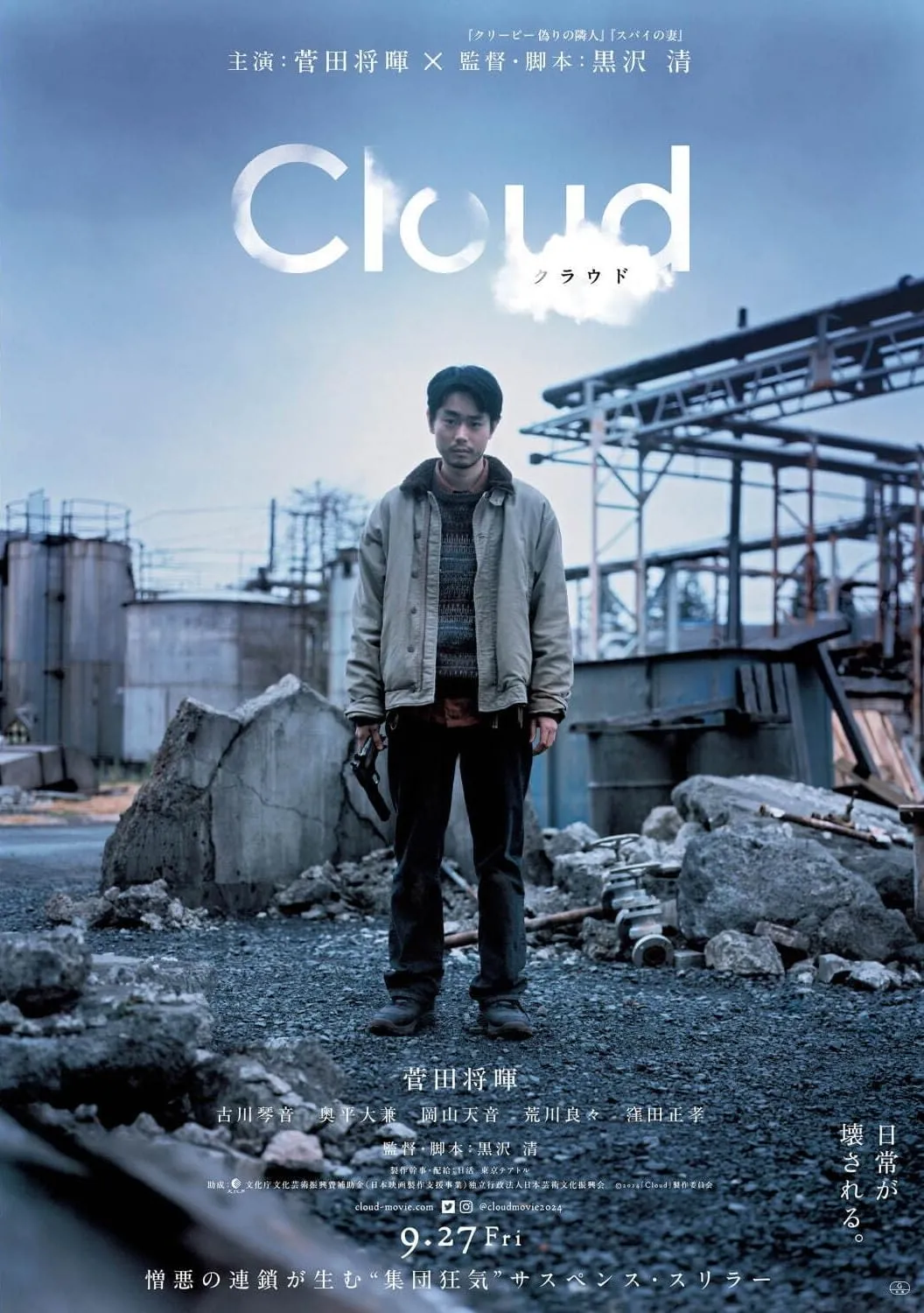Renowned Japanese filmmaker Kiyoshi Kurosawa has long explored how technology can shape human connection and bring out both the best and worst in people. In his latest film, “Cloud,” Kurosawa turns his lens to the modern internet era and the impersonal—yet intensely personal—ways it can breed conflict.
We meet Ryosuke Yoshii, a young man who makes a living reselling goods online. Operating solely through digital channels, Yoshii buys items in bulk and relists them at inflated prices. It’s a hustle that requires detachment from both the merchandise and customers. But this virtual business also comes with invisible enemies, as aggrieved buyers anonymously mobilize against Yoshii.
When their simmering digital anger suddenly erupts into real threats of violence, Yoshii must confront the very human impacts of his virtually detached dealings. Meanwhile, Kurosawa reveals how easily online interactions—from harmless to harmful—can distort relationships and blur moral lines in modern networked societies.
Through Yoshii’s escalating plight, Kurosawa crafts a thought-provoking thriller pondering technology’s influence on human society. Stylish genre filmmaking brings these timely themes to an artful climax, proving once more Kurosawa’s mastery at exploring humanity’s darkness—and light—in even our most “virtual” of worlds.
Ryosuke’s Risky Business
We’re introduced to Ryosuke Yoshii, a young man making a living through an online resale operation in Tokyo. Scouring auctions for cheap goods, he flips merchandise at inflated prices from his cramped apartment. It’s a precarious way to get by, but it allows Ryosuke independence from a day job he finds dreary.
However, Ryosuke’s cutthroat virtual dealings earn ire from aggrieved customers. Operating anonymously, he’s oblivious to real-world impacts. But resentment simmers online, where those he’s crossed anonymously mobilize.
Hoping for novelty, Ryosuke takes his business rural after linking with an old friend. In the countryside with his girlfriend Akiko, unease persists. Strange occurrences like a targeted home invasion shake Ryosuke’s normally laser focus.
It becomes clear Ryosuke’s past victims have united, no longer content with digital vitriol. Convinced of Ryosuke’s identity from online sleuthing, this decentralized mob goes on the hunt.
All roads lead to an abandoned factory, where climactic confrontation unleashes carnage. There, the film’s virtuous journey into the physical realm reaches an explosive conclusion, as those Ryosuke wronged virtually now seek bloody justice in person. In the climactic encounter, Kurosawa brings this thought-provoking tale of modern disconnect to a gripping finale.
Kurosawa’s Visual Mastery
Beneath Cloud’s exploration of modern disconnection lies in director Kiyoshi Kurosawa’s peerless visual expertise. Action scenes burst with crisp energy, showing a veteran grasping genre tropes and finding new life within them.
Yet it’s in stiller moments that Kurosawa’s artistic brilliance emerges. His sterile, cluttered frames mirror the cold virtual barriers isolating characters. Box-filled apartments and lonely broadband cables form a pointed visual motif.
Even intimate scenes feel sterile, the camera circling faces to find only numbness within. This disparity between visually poetic loneliness and eruptions of brutality heightens the film’s potent disconnect themes.
Kurosawa’s camera dances among the quiet and chaos with equal artistry. One explosion of violence sees shots sliced with nerve-shredding speed, imbuing devastation with horrific beauty. It’s here genre and artistry merge most seamlessly.
This blend reaches full expression in Cloud’s unforgettable conclusion. A hellish vision of society’s online sins playing out, it offers no catharsis—oonly a bleak damnation left hauntingly enigmatic and metaphorical by the director’s visual mastery. Viewers are left pondering modern living’s costs, seen through Kurosawa’s singular vision.
The Dehumanizing Virtual World
Beneath Cloud’s surface exists timely commentary on modern society. Kurosawa spotlights how online anonymity breeds rage out of all proportions as anonymous grudges coalesce.
His characters reflect our increasing valuation of virtual objects over human bonds. For Yoshii, people matter only as faceless buyers, important solely for profit potential. Even his live-in girlfriend remains an ornament in his virtual business’s backdrop.
Capitalism’s influence feels inescapable. Characters gauge self-worth through profits and possessions. Basic jobs and relationships only constrain business “success.” People become commodities, valued based on wealth generation.
Through it all, networks paradoxically detach us from real-world impacts. Kurosawa shows the calamity when virtual frustrations materialize. His climactic confrontation serves as a grim warning: the virtual world infects and consumes.
Cloud lingers as a sobering comment on 21st century disconnectedness. Kurosawa’s vision suggests continuing down this path risks reducing humanity to virtual currency. Only by reclaiming our humanity can technology again be a tool, not a trap imprisoning modern networked life. The film leaves its critique for viewers to ponder in a world increasingly living online.
Defining Cloud’s Complex Characters
At the film’s center stands Masaki Suda’s mesmerizing take on Ryosuke Yoshii. Online, he performs sales with robotic precision, yet flashes exist beneath the surface, hinting at fragility.
Yoshii navigates virtual and physical worlds with differing personas. Detached selling clashes with off-guard vulnerability, leaving viewers grasping for understanding. Suda imbues a multilayered character silenced by digital life’s demands.
Supporting cast leave impressions equal to leads. The yakuza-linked assistant Sano proves more complicated than expected. Played with sensitive nuance by Daiken Okudaira, he shows hidden courage protecting Yoshii to the story’s riveting end.
Similarly, vengeful ex-boss Takimoto comes across as a man whose online provocations stemmed from deeper wounds. Portrayed with subtle menace by Yoshiyoshi Arakawa, his rage emerges credible rather than purely sinister.
Even Kotone Furukawa’s Akiko, given scarce characterization, cultivates an intriguing mystique. Behind vacant smiles lies a woman discontent in digital society’s shadows, seeking purpose beyond material wants.
Collectively, these performances imbue figures divided online yet profoundly human. Kurosawa finds in each character complex threads society’s virtual bent risks severing from our shared nature. Their nuances resonate long after Cloud fades, prodding reflection on the costs of modern disconnected life.
A Master Blends Styles and Subverts Expectations
Kurosawa proves once more a genre-bending maestro in Cloud. The film seamlessly fuses arthouse ambitions with thriller tropes. Taut action arises from his clinical aesthetic, violence feeling stark yet somehow removed.
Tonally, Cloud is equally mercurial. Moments of isolation and suspense give way to alarmingly kinetic set pieces. Kurosawa relishes keeping viewers unsure of what’s next, twisting expectations at a clip.
Structurally, the film surprises as well. Its drifting middle section sees building menace transform into madness. What seemed like a slow burn unleashes in a heartbeat into full-fledged peril, heightening unease.
Perhaps most striking is how Cloud veers from psychological horror notions. Where directors like Nakata mined dread from the unknown, Kurosawa finds it in the mundane. His internet-aged boogeymen feel chillingly within reach in today’s networked world.
Masterfully, no genre fully contains Cloud. It uses, subverts, and transcends labels to craft a tale uniquely Kurosawan. His deft blending of styles and unpredictable shifts prove once more why he remains sought after on the world cinema stage.
Toxic Connections, Timeless Warnings
For viewers eager to ponder society’s digital trajectory, Cloud proves a thought-provoking provocation. Kurosawa crafts more than a thriller—he molds a warning for a world ever-tethered to screens yet detached from shared humanity.
Through visual mastery and genre hybridization, the legendary auteur explores how anonymity breeds disproportionate rage online. His examination feels eerily prescient as technology entrenches in daily life. Yoshii acts as a troubled portrait of networked existence, silenced by profit yet yearning connection.
While certain plot points sail beyond belief, Kurosawa’s intent resonates—that online callousness risks infecting reality. His climactic confrontation serves as a dire picture of what mass hysteria unleashed might look and feel. No easy answers arise, only unsettled questions on technology’s influence over our fragile bonds.
For fans of challenging, artfully-made cinema, Cloud proves a worthy addition to Kurosawa’s acclaimed filmography. Reverberations of his timely themes will linger long for those engaging its disturbing vision of modern living. Even casual viewers seeking thought-provoking genre work will find much to admire in this unforgettable fusion of styles.
The Review
Cloud
Kiyoshi Kurosawa's Cloud is a piercingly relevant meditation on humanity's digital disconnect, brought to life through the director's singular blend of genre thrills, artistry, and unflinching social commentary.
PROS
- Thought-provoking exploration of modern technology and its societal costs
- Nuanced characterizations that leave a lasting impression
- Hair-raising action sequences executed with Kurosawa's customary visual panache
- Timely themes that resonate in an increasingly networked world
CONS
- Plotline stretches plausibility at points
- The middle section drags the mounting tension
- Open-ended conclusion won't resonate with all viewers.


















































Discussion about this post